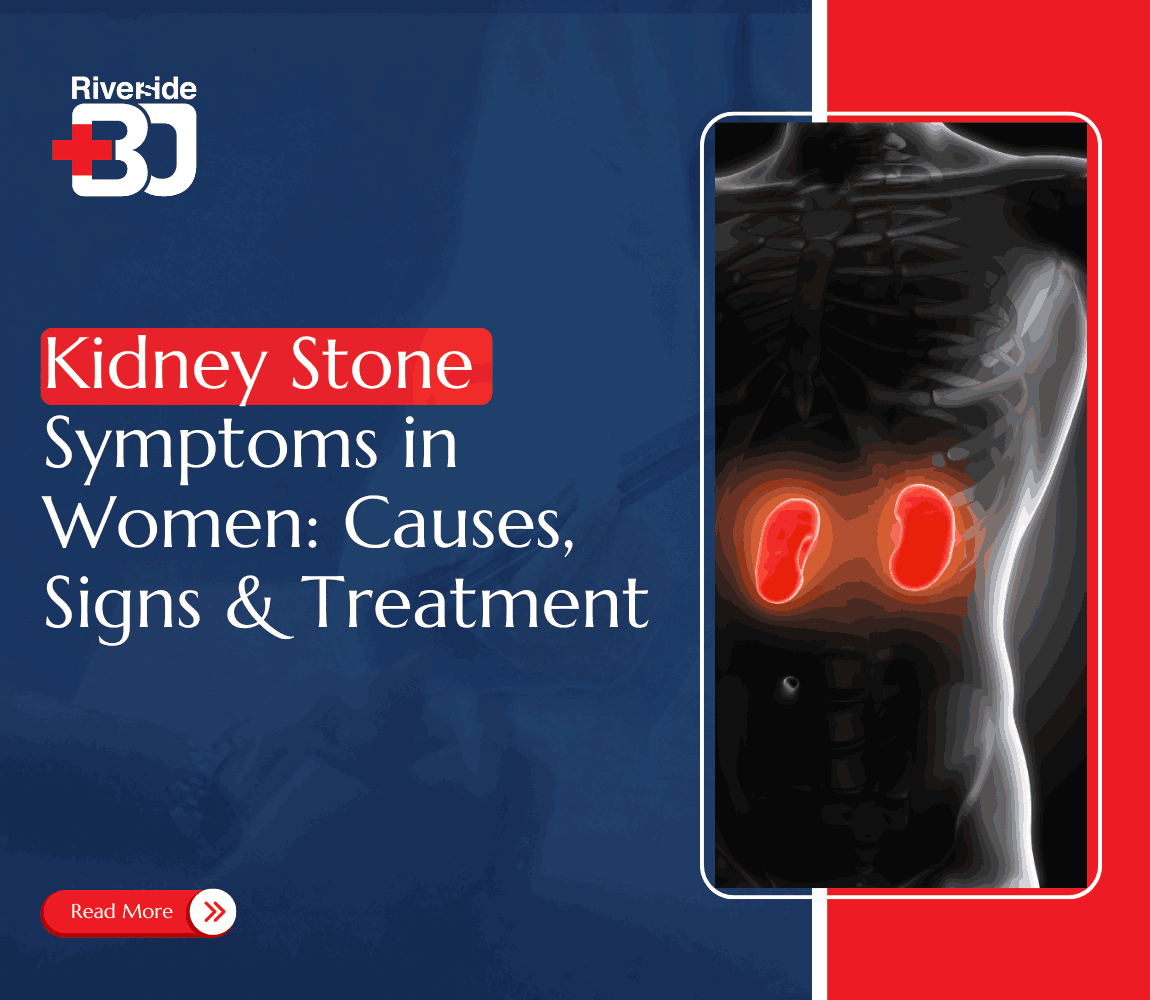Many women mistake severe abdominal pain for a simple urinary infection or menstrual cramp. In reality, such discomfort may sometimes signal early kidney stone symptoms.
According to the Urology Times, the prevalence of kidney stones in women rose from 6.5% to 9.1% over a little more than a decade. This rising trend shows why timely diagnosis and care are crucial.
Since the early signs may appear minor, stones may remain unnoticed until the pain becomes severe or urine flow is blocked.
This article outlines the key kidney stone symptoms in women, their causes, and treatment options. It also shares simple prevention tips to help protect kidney health.
What Are Kidney Stones?
Kidney stones are small, hard clumps that develop inside the kidneys when minerals and salts in the urine crystallize and stick together.
Normally, urine contains fluids that help dissolve these substances, but when the balance is disrupted, crystals can build up and turn into stones.
The size of kidney stones can vary greatly. Some are so small they pass unnoticed, while others can grow large enough to block the urinary tract.
Stones may remain in the kidney or travel down into the ureter. This movement is often what causes the sudden, sharp pain that kidney stones are known for.
What are the Kidney Stone Symptoms in Women?
The buildup inside the kidneys often reveals itself through some symptoms that resemble common urology problems. Because the symptoms appear ordinary, they are often overlooked, potentially leading to serious complications.
Most common kidney stone symptoms in women include:
1) Severe Lower Abdominal Or Back Pain
One of the most noticeable symptoms of kidney stones that female patients experience is sharp pain in the back, side, or lower abdomen.
This pain often comes in waves and may spread to the groin area. Unlike menstrual cramps, kidney stone pain can be sudden, very intense, and may last for hours.
2) Painful Urination Or Burning Sensation
Whenever a stone moves into the lower urinary tract, women may experience pain or a burning feeling while urinating.
This is why kidney stones in women are often mistaken for urinary tract infections.
3) Blood In Urine (Hematuria)
Kidney stones can scratch the delicate lining of the urinary tract, leading to blood in urine. The urine may appear pink, reddish, or brownish.
In some cases, the blood is invisible to the naked eye and can only be detected through lab tests.
4) Nausea, Vomiting, And Fatigue
The body often responds to the intense pain caused by kidney stones with nausea or vomiting.
Along with this, women may feel fatigued or weak, which can disrupt regular routines and overall well-being.
5) Frequent Urge To Urinate
Another symptom of female kidney stone cases is a frequent urge to urinate more often than usual.
However, the amount of urine passed is usually very little. This can cause discomfort in daily life.
Causes Of Kidney Stones In Women
Kidney stone symptoms in women are linked to several underlying causes. Stones gradually form when body conditions favor minerals and salts sticking together.
Understanding the causes of kidney stones in women is the first step toward prevention.
1) Dehydration And Low Water Intake:
Not drinking enough water is one of the leading triggers of kidney stones in women. When the fluid intake is low, urine becomes concentrated, allowing minerals like calcium and oxalate to crystallize.
Women with busy schedules skip hydration, unknowingly increasing their risk.
2) High Salt And Protein Diet:
Diet plays an important role in stone formation. A diet high in salt raises calcium levels in urine, while excessive animal protein increases uric acid.
Both can contribute to stone development if left unchecked.
3) Family History Of Kidney Stones:
Genetics also influences risk. If there is a family history of stones, women are more likely to develop them too.
This doesn’t make stones inevitable, but it does highlight the importance of extra care with hydration, diet, and lifestyle choices.
4) Hormonal Changes And Lifestyle Factors:
Hormonal shifts from pregnancy, menopause, or medical conditions can influence kidney function and stone risk.
Add to that modern lifestyle factors like obesity, lack of exercise, and poor dietary habits, and the likelihood of a female having a kidney stone increases.
Risk Factors For Kidney Stones In Women
Not every woman will develop kidney stones, yet certain factors can increase the risk.
By understanding these risk factors for kidney stones in women, preventive steps can be taken early:
1) Pregnancy And Kidney Stone Risk
Pregnancy brings many hormonal changes, and the urinary system is not exempt.
While kidney stones during pregnancy are uncommon, they may cause high discomfort and require careful medical care to protect both mother and baby.
2) Obesity And Sedentary Lifestyle
Obesity doesn’t just impact the heart and joints; it also affects kidney health. It can change how calcium and uric acid are processed.
When this is combined with a sedentary lifestyle, kidneys face extra strain, and the risk of a female kidney stone increases.
Therefore, maintaining a balanced weight becomes an important step in prevention.
3) Certain Medications Or Supplements
In addition, some medications and supplements may play a role. Long-term use of calcium-based antacids, certain diuretics, or high doses of vitamin C and D can increase stone risk.
This is why it’s best to consult a doctor about how medicines may affect kidney health.
Diagnosis Of Kidney Stones In Women
To confirm kidney stones, doctors recommend specific tests that help identify their size, type, and location. The most common diagnostic methods include:
1) Ultrasound And CT Scan
An ultrasound is usually the first step since it’s safe, quick, and effective for spotting stones of moderate size.
However, if results are unclear or very small stones are suspected, doctors may recommend a CT scan, which provides detailed images of the urinary tract.
2) Urine And Blood Tests
Along with imaging, lab tests offer important clues. A urine test may reveal crystals, minerals, or infection, while blood tests can show high calcium or uric acid levels.
Together, these tests not only confirm the presence of stones but also explain why they developed.
Prevention Of Kidney Stones In Women
Prevention is the real key to long-term kidney health. Adopting a few daily habits can lower the risk of kidney stones in women.
1) Staying Hydrated
Water is the kidneys’ strongest defense. Drinking enough fluids throughout the day helps dilute minerals in urine so they don’t clump together into stones.
As a simple check, urine should be clear or light yellow. This is especially important in hot weather or after exercise.
2) Balanced Diet
Diet also plays an important role. Cutting back on salty foods, processed snacks, and excess animal protein reduces stone risk.
At the same time, adding calcium-rich foods like milk, yogurt, or leafy greens helps bind oxalates in the digestive system, preventing them from reaching the kidneys. A balanced diet supports kidney health and overall well-being.
3) Regular Medical Check-ups
Kidney stones can return if their root cause isn’t addressed. Regular check-ups, even in the absence of symptoms, allow doctors to detect early warning signs.
This is especially important for women with a history of stones or family risk factors.
Final Thoughts
Kidney stones in women can often be treated successfully when identified early. With modern options, care is safer, less invasive, and recovery is much faster, allowing women to return to their normal routines sooner.
Early awareness of symptoms and regular check-ups play a vital role in prevention. By addressing risks such as dehydration, diet, and lifestyle factors, many women can significantly reduce the chances of developing stones.
For trusted care, patients can visit the best urology hospital in Mumbai or any other metro city.
A urologist can confirm the diagnosis and recommend the right treatment plan, ensuring your kidney health is protected in the long run.
At Riverside BNJ Hospital, specialists provide accurate diagnosis and advanced treatment options, helping women manage kidney health with confidence and peace of mind.
To know more or book a consultation, contact us now.
FAQs
What are some common kidney stone symptoms in women?
Common kidney stone symptoms in women include sharp back or abdominal pain, painful urination, blood in urine, frequent urges, nausea, and fatigue.
Do kidney stones affect periods?
They don’t directly impact menstrual cycles, but the pain can mimic period cramps. If abdominal pain feels unusually severe or persistent, it’s wise to consult a doctor.
Can kidney stones cause frequent urination?
Yes, stones may irritate the bladder or block urine flow, leading to a frequent urge to urinate. Even small stones can create discomfort and repeated bathroom trips.
How to identify kidney stone pain?
Kidney stone pain is sharp, sudden, and often comes in waves. It typically begins in the back or side, radiating to the lower abdomen or groin, unlike muscle pain.
Are kidney stones during pregnancy common?
They are uncommon in pregnancy but possible due to hormonal changes. Medical monitoring is required to protect both mother and baby from potential complications.
What is the best treatment for kidney stones in women?
Treatment depends on the stone’s size and location. Small stones may pass naturally, while larger ones often need shock wave therapy, laser treatment, or minimally invasive surgery.

